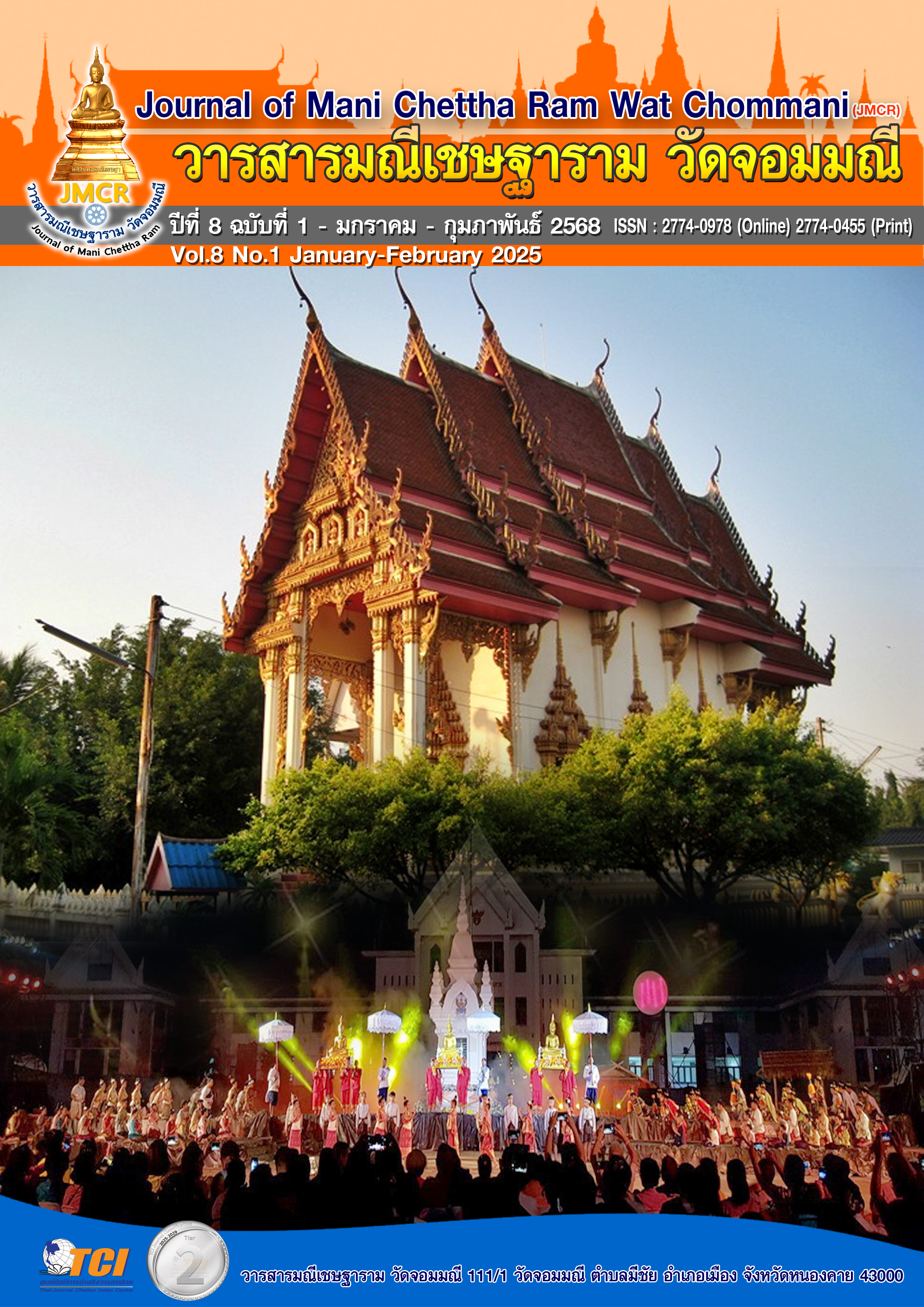THE DEVELOPMENT OF AN EDUCATIONAL BOARD GAME BASED ON THE PROBLEM-SOLVING METHOD WITH THINK-PAIR-SHARE TO ENHANCE PROBLEM-SOLVING SKILLS AND ATTITUDES TOWARDS LEARNING PHYSICS FOR MATTHAYOMSUKSA 4 STUDENTS
Keywords:
An educational board game, Problem-solving skills, Learning attitudesAbstract
The purposes of this study were 1) to develop the educational board game with quality and efficiency according to the 80/80 criteria, 2) to study and compare problem-solving skills before and after using the educational board game, 3) to study and compare the learning achievements of students before and after using the educational board game, 4) to study the students’ attitude towards playing the educational board game, 5) to investigate the students’ satisfaction towards the educational board game. The sample consisted of 30 Matthayomsuksa 4/1 students at Chumpholphonphisai School selected by purposive sampling. The research instruments were the educational board game, the quality assessment form of the educational board game, a problem-solving skills test, a learning achievement test, a students’ attitude questionnaire and a students’ satisfaction questionnaire. The percentage, mean, standard deviation, efficiency values (E1/E2) and t-test for Dependent Samples were used for data analysis.
The findings of this research were as follows: 1) The quality of the educational board game in terms of content quality, the average was 4.69, which was the highest level. In terms of innovation and technology, the average was 4.64, which was the highest level. The efficiency of educational board game was 89.28/88.00. 2) The result of the development of students' problem-solving skills using educational board games was higher than before studying, which was significantly different at the .05 level. 3) The learning achievement of students after using the educational board game was higher than before studying, which was significantly different at the .05 level. 4) The students' attitude towards playing the educational board game was at the highest level, with an overall average of 4.69. and 5) The students’ satisfaction towards the educational board game was at the highest level, with an overall average of 4.76.
References
กิ่งกาญจน์ บูรณสินวัฒนกูล. (2562). การพัฒนาสื่อการเรียนรู้บอร์ดเกมการศึกษาเพื่อส่งเสริมความสามารถการเรียนรู้ในรายวิชาพัฒนาการแบบเรียนภาษาไทยและความสุขในการเรียนรู้ สำหรับนิสิตระดับปริญญาตรี. กรุงเทพมหานคร: มหาวิทยาลัยศรีนครินทรวิโรฒ.
จุฑามาศ ผกากลีบ. (2561). การพัฒนารูปแบบการสอนแบบสืบเสาะหาความรู้โดยบูรณาการเทคนิคการสอนแบบเพื่อนคู่คิดในรายวิชาวิทยาศาสตร์ สำหรับนักเรียนชั้นมัธยมศึกษาปีที่ 6. วารสารวิชาการการจัดการเทคโนโลยีสารสนเทศและนวัตกรรม. 5(1). 204-214
นุชนาถ นุชมี. (2563).การพัฒนาบอร์ดเกมตามแนวการจัดการเรียนรู้แบบสืบสอบ เรื่อง อาชญากรรมคอมพิวเตอร์ เพื่อส่งเสริมการคิดอย่างเป็นระบบ ของนักเรียนชั้นมัธยมศึกษาปีที่ 6. ใน วิทยานิพนธ์. คณะศึกษาศาสตร์ : มหาวิทยาลัยศรีนครินทรวิโรฒ.
บุญชม ศรีสะอาด. (2553). การวิจัยเบื้องต้น (พิมพ์ครั้งที่ 8). กรุงเทพมหานคร: สุวีริยาสาส์น.
ปิยะพงษ์ งันลาโสม.(2563). การพัฒนาบอร์ดเกมเพื่อส่งเสริมผลสัมฤทธิ์ทางการเรียนรู้และเจตคติต่อการเรียนวรรณคดีไทย ของนักเรียนชั้นมัธยมศึกษาปีที่ 1. ใน วิทยานิพนธ์ศึกษาศาสตรมหาบัณฑิต. กรุงเทพมหานคร: มหาวิทยาลัยธรรมศาสตร์.
ลักขณา สริวัฒน์. (2557). จิตวิทยาสำหรับครู. กรุงเทพมหานคร: โอเดียนสโตร์.
วรรณิภา พรหมหาราช. (2564). การจัดการเรียนรู้ด้วยกระบวนการสืบเสาะหาความรู้ 5 ขั้น ร่วมกับบอร์ดเกม เรื่อง พันธะเคมี เพื่อพัฒนาทักษะการแก้ปัญหาของนักเรียนชั้นมัธยมศึกษาปีที่ 4. ใน วิทยานิพนธ์ปริญญาครุศาสตรมหาบัณฑิต. มหาสารคาม : มหาวิทยาลัยราชภัฎมหาสารคาม.
ศดานันท์ แก้วศรี. (2563). การออกแบบและพัฒนาเกมกระดานเรื่อง ระบบภูมิคุ้มกัน. ใน วิทยานิพนธ์ปริญญาวิทยาศาสตรมหาบัณฑิต : มหาวิทยาลัยทักษิณ.
ศิวนิต อรรถวุฒิกุล. (2555).การพัฒนากระบวนการแลกเปลี่ยนเรียนรู้โดยใช้คอมพิวเตอร์สนับสนุนการเรียนรู้อย่างร่วมมือตามแนวคิดการเรียนรู้แบบเพื่อนช่วยเพื่อนเพื่อสร้างพฤติกรรม การสร้าง ความรู้ของนิสิตนักศึกษาระดับบัณฑิตศึกษา. ใน วิทยานิพนธ์ครุศาสตร์ดุษฎีบัณฑิต : จุฬาลงกรณ์มหาวิทยาลัย.
สนธิ พลชัยยา. (2557). สะเต็มศึกษากับการคิดขั้นสูง. นิตยสาร สสวท.42(189).8.
สุคนธ์ สินธพานนท์. (2560). ครูยุคใหม่กับการจัดการเรียนรู้สู่การศึกษา 4.0. กรุงเทพมหานคร: ศูนย์หนังสือจุฬาลงกรณ์ มหาวิทยาลัย.
Boom, Benjamin S. (1956). Taxonomy of Education Objective Handbook : Cognitive Domain. New York : David Mackey Company, Inc
Dewey, John. (1933). How We Thing. New York : D.C. Health and Company.
Poya, George. (1957). How to solve it. New Jersey : Princeton University Press.
Silverman, D. (2013). How to learn board game design and development. Massachusetts: McGraw - Hill.




